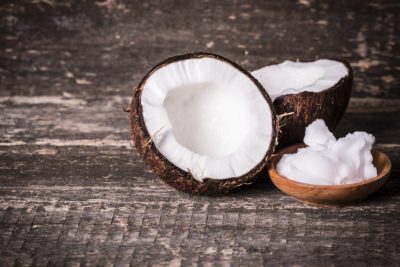 Whether it’s for body care or cooking, coconut oil has a purpose throughout the household. While the benefits are plentiful, so is the confusion behind different types, labels, and brand packaging. Here’s a breakdown of the most common questions to make decoding coconut oils a whole lot easier.
Whether it’s for body care or cooking, coconut oil has a purpose throughout the household. While the benefits are plentiful, so is the confusion behind different types, labels, and brand packaging. Here’s a breakdown of the most common questions to make decoding coconut oils a whole lot easier.
Refined vs. Unrefined
There are two main kinds of coconut oil: refined and unrefined. Refined oils are possess no coconut flavor or aroma. They are produced from dried copra, not fresh coconuts, and the oil typically undergoes various levels of processing, including being deodorized and bleached. Unrefined coconut oil is normally considered virgin and it possesses a light coconut taste and aroma, that will vary from brand to brand. This mostly depends on the freshness of the coconut used and type of processing it was subjected to.
Virgin vs. Extra Virgin
An unrefined coconut oil is typically labeled “virgin” or “extra-virgin”. However, in the USA, there is no legal definition or standard for the term, “extra virgin” as it applies to coconut oil. Therefore, there is not any consistent difference between virgin and extra-virgin coconut oils across all brands. Each brand tends to have their own definition of these labels but in general both virgin and extra-virgin coconut oils are made from the first pressing of fresh, raw coconut without the addition of any chemicals. The term virgin has come to mean that the oil is generally unprocessed. For example, virgin coconut oil usually has not been bleached, deodorized, or refined. Virgin oil is typically made from fresh coconuts, but processing techniques will still vary in determining the product’s quality. Virgin oil usually has a coconut scent flavor and heats up to 350° F.
Whole Kernel vs. White Kernel
Whole kernel oil, which is made from the coconut kernel with the inside skin left on, is more nutritious and has a slightly nuttier flavor, whereas white kernel oil is made from coconuts whose brown inner skins have been removed and has a milder, more delicate aroma. Both oils have the same culinary and body care uses. Whole kernel is marginally more nutritious and has a slightly nuttier flavor. They’re both unrefined so they have the same smoke point.
Methods of Extraction
Centrifuge vs. Cold- Pressed vs. Expeller-pressed
The nature of all oils is such that it involves processing; oils are not whole, and do not naturally exist by themselves in nature. Coconut oil is most commonly processed using expeller-pressed or cold-pressed methods. Expeller-pressed is a mechanical process that extracts oil from seeds and nuts, at high pressure and heat, and is usually used for refined oils. Cold-pressed coconut oils are pressed in a heat-controlled environment to keep temperatures below 49ºC or 120ºF degrees. Cold pressing does not designate what type of pressing machine is used. However, oil that has been cold pressed should not have been exposed to high heat before or after pressing.
Centrifuged coconut oil is generally one of the purest and most expensive oils. During the centrifuge process, coconuts are shelled, crushed and ground into a slurry. First, the milk is extracted from the meat; then the remaining coconut is placed in a high speed centrifuge that rapidly spins the contents. Through this spinning process, the oil is separated from the meat. Centrifuge coconut oil retains a strong coconut taste and smell and requires no further refining.
Raw
Expeller-pressed and Cold-pressed don’t necessarily mean “raw.” Raw generally means that a food is not processed. People seek raw food because less processing means higher the nutrient content. As you can see above to obtain coconut oil it must be extracted in some way. Therefore the term raw is loosely thrown around by brands but it most often indicates the oil has never been heated to a temperature higher than 96 degrees Fahrenheit. Temperatures above this point are known to destroy natural enzymes.
Smoke Point
Unrefined coconut oil smokes in the range of 350° F. A more refined coconut oil would have a higher smoke point (just above 400° F)
Storing Coconut Oil
It is recommenced to store coconut oil at 76° F to keep it at a solid. If your house is on the warmer side your jar of coconut oil could melt to a liquid, but this is nothing to fear. The quality of coconut oil does not change as it phases between liquid and solids and back again.
Which type of coconut oil should you choose?
To pick a high quality product, focus on coconut oil that is virgin, organic, and processed in the least invasive way. Focus also on reputable companies who provide fair trade products and accurate, detailed information about their coconut oil.





